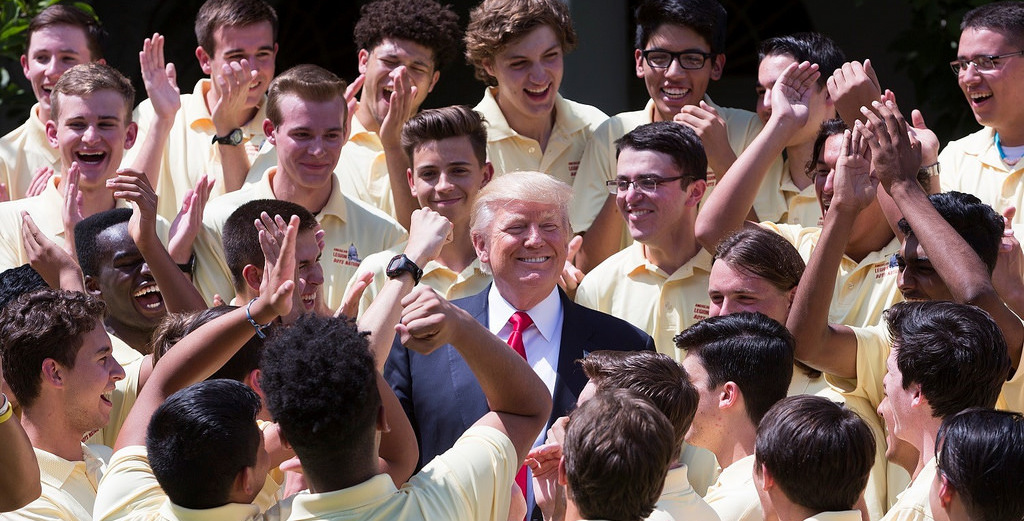Who was the last U.S. politician who made common sense? Return with us to those thrilling days of yesteryear: Bernie Sanders twangs again: “The American people are sick and tired of hearing about your [Hillary’s] damn emails!” Substitute Trump for Clinton and tweets for emails, and it goes: “The American people are sick and tired of hearing about your damn tweets.’ If only.
Let me “nuance” that. Everybody loves gossip. If there are exceptions, they require explanation because gossip is deeply human. If it’s lying in the street, you pick it up, the way the Bolsheviks picked power up in 1917. (I’ve just returned from Russia, please excuse my metaphors.)
But you shouldn’t mistake gossip about Trump’s tweets, with real politics that affects actual life and impacts those you care about. I bet Bernie gossips too. You can have both: gossip and politics. But not under the spell of Trump Derangement Syndrome.
TDS is real and has acquired dictionary status. Here’s this week’s example: If you wanted to design an effective Trump reelection strategy for 2020, you’d tweet attacks on your own attorney general, Jeff Sessions, and top those up with a ban on trans members in the U.S. military.
Then while your entire political and media opposition react dyspeptically to those, you’d fly to Wisconsin — one of four Midwest states that gave you victory in 2016 — and announce a Chinese-owned factory there that’ll bring 3,000 jobs — here’s the key word — back to the U.S. They voted for Trump for merely promising it last time; imagine their gratitude when he actually does it.
The ongoing version of TDS, versus minute-by-minute variants, is the Trump-Putin conspiracy. What’s true, almost certainly, is the Russians tried to influence the U.S. election for their own purposes by tilting it toward Trump — because everyone tries to influence everyone else’s elections. The U.S. did it in Russia in 1996 when it looked like Boris Yeltsin would lose to an ex-Communist. They co-ordinated a huge IMF loan and sent advisers to work with Yeltsin.
What’s totally unproven, despite a vaunted consensus among 17 U.S. intel agencies, is that they worked directly with Trump on it. Why would they? They knew he and his people were idiots and would probably screw up any decent schemes they schemed. They’d be more effective alone.
In fact, though they may have helped get him in, they aren’t benefitting due to his ineptitude. Even if he wants to help them, he’s fouled the whole situation with suspicion. Putin, I was told there, is waiting for the next president to ask some favours.
Or take those lists of Trump lies. All leaders lie, though rarely in such plain sight and so compulsively. But the lists often contain what U.S. political thinker David Bromwich calls typical “opportunistic half-truths, scattershot promises, changes of tack…hyperbolic exaggerations.” Trump gets unique treatment.
The most poignant effect of TDS has been the decline of a generation of fine U.S. political comics. Stephen Colbert, who was an incisive yet empathic mocker of the right during the “W” years, didn’t even try for witty when he said, “The only thing [Trump’s] mouth is good for is being Vladimir Putin’s c— holster.” Samantha Bee simply got tiresome this week listing Trump appointees devoured by “the taint that never sleeps.” Even she seemed bored.
The net TDS effect has been to distract Democrats and journalists from a critique connecting to people’s real lives. Not just on issues Bernie would (and does) bewail, like health care or inequality, but in the very areas they’ve targeted, like Trump’s Russia connections. He may or may not have property there but for his eternally iffy real estate deals in the U.S. and elsewhere he likely relied on Russian bankers with tight ties to the state, as is normal there. He fired the U.S. prosecutor who was investigating some of those same Russians.
Just this week we learned a small tech startup with money and family ties to Trump son-in-law/adviser Jared Kushner, attended a White House “summit” that Jared organized, alongside titans, such as Microsoft. It was their “major breakthrough.”
That’s the real nature of collusion in Trumpworld. They’d never forego business opportunities just because they’re in public office. It’s behaviour most Americans would both get and deplore. It avoids TDS distractions and raises Bernie-type questions about the role of the rich in politics. It even includes gossip.
This column was first published in the Toronto Star.
Image: Flickr/The White House
Like this article? rabble is reader-supported journalism. Chip in to keep stories like these coming.




